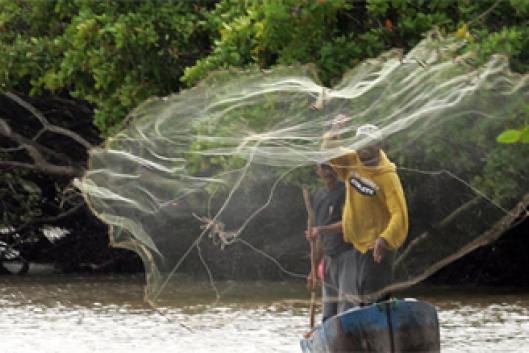Communities, peoples and civil society organizations have worked for years to raise the visibility of the significant benefits of the mangrove ecosystem and the importance of its existence. They have fought for the recognition of mangroves as highly productive systems that provide livelihoods and a space for the practice of the cultures and traditions of coastal peoples. “The mangrove is our natural enterprise, it is our employment, it does not ask us for our qualifications or a CV or identification. As long as we are in good health we can cast our nets and harvest our food,” declared Enrique Bonilla, president of COGMANGLAR and a fisherman from Champerico, Guatemala.
Today, the former perception of mangroves as mosquito-infested swamps has changed, but the struggle to defend them has become increasingly difficult in the face of the new and aggressive actors threatening their existence and the survival of the peoples and communities who inhabit them, from Latin America to Asia to Africa. “They are slowly exterminating us. Government policies criminalize and impoverish us. We are not poor; we have great wealth that the powerful want to appropriate, and we call that environmental racism,” said Marizhelia López of the Movement of Fishermen and Fisherwomen of Bahia, Brazil, expressing her concern over the loss of territories.
In addition to the shrimp farming industry, which has historically been responsible for the destruction of thousands of hectares of mangroves in tropical regions, mangroves now face a long list of threats, including oil drilling, tourism megaprojects, the construction of dams and reservoirs on rivers, metal mining on the coasts and seabeds, industrial monoculture plantations of trees and agrofuel crops like sugar cane and oil palm, large-scale port complexes and wind farms, among others. All of these activities are increasingly threatening the collective livelihoods and lives of coastal peoples and form part of a process of the privatization and grabbing of territories and extraction and exploitation of nature for the exclusive benefit of particular private interests. As an example, the government of Honduras recently launched a proposal for so-called “model cities” or Employment and Economic Development Zones (ZEDE) in the country’s southern region. According to the Committee for the Defence and Development of the Flora and Fauna of the Gulf of Fonseca (CODDEFFAGOL), this is an outrageous proposal that would cause irreversible damage to the mangrove wetlands of the gulf.
Mangroves, considered one of the planet’s five most productive ecological units, are the main source of food and livelihoods for millions of coastal families who practise artisanal and subsistence fishing and gather shellfish such as conchs, snails and crabs. As a result, mangroves are the foundation of food sovereignty for these peoples. They also serve as a natural protective barrier against the impacts of climate change. Silvia Quiroa of CESTA in El Salvador stressed, “The climate crisis is a reality that is already affecting communities and peoples. We must challenge and oppose the utilization of mangroves as carbon sinks. The survival of the peoples will be the path to follow.”
Above all, mangroves are territories. They are one of the basic elements that sustain life in coastal areas, which in most countries are public-use areas. According to Líder Góngora of C-CONDEM, Ecuador, “It is important to recognize the maternal nature of mangroves, which are like a womb in which a diversity of species are bred, raised, protected and reproduced.”
It is of great strategic importance to demand the designation and maintenance of marine coastal territories as public areas, as well as to demand enforcement of the collective rights of the communities and peoples who inhabit them to make decisions on their collective management, protection and use. This is a right that corresponds to them, because they are the ones who have long guaranteed the existence and survival of mangroves through the wisdom, cultural practices and ancestral knowledge and traditions passed down from generation to generation. “In Guatemala, for decades, the national territorial reserves have been privatized, used by politicians as payoffs in their electoral campaigns. There is still a great deal of interest on the part of large landholders, sugar plantation owners, shrimp farm owners and urban developers to continue grabbing more territories,” warned Sergio Maldonado of Avedichamp in Guatemala.
In the struggle to defend mangroves, women play a fundamental role. The contribution of women to local and community development, to the construction and defence of territories, and to the protection and transmission of knowledge is essential, and should be valued and highlighted. At the same time, it is crucial to recognize the situation of inequality between men and women in order to promote social justice and equity.
The members of Redmanglar International aspire to a world in which the traditional use of territories to sustain life is given priority over business, in which local communities regain control over their own economies, and exchanges among peoples take place on the basis of solidarity and equality.
By Carlos Salvatierra, Executive Secretary of Redmanglar Internacional. Based on discussions held during the Redmanglar strategy meeting in February 2014.
